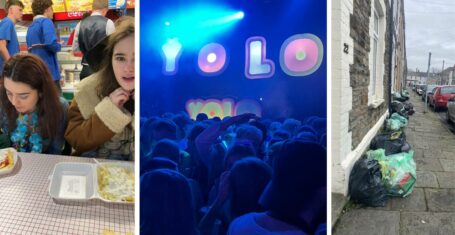
‘My home was bombed and I lost my best friend’: A Syrian refugee’s story
Mohamed fled Aleppo. Now he’s working with Cardiff students taking action to help refugees
“In Aleppo there are no more doctors. They need more doctors,” begins Mohamed.
As the fighting in Aleppo has intensified recently, it has rarely been out of the news. By some estimates, 4.8 million people have left Syria. Mohamed is one of them.
“Aleppo is a big city, the second biggest in Syria. In comparison to Cardiff it is way bigger. It was sad to hear that many weeks ago the last hospital stopped functioning. When I was a child my dream was to be a doctor and help the people. My late mother always wanted me to be a doctor. I worked hard to achieve this dream and I successfully got into Aleppo medical school. Once I passed the first two years I had to leave Syria because of the war.
“The Syrian army asked why we didn’t want to fight with them. I told them that we don’t want to fight. I don’t want to be a part of killing anyone. In my last month in Aleppo I was living in an area that was close to the fighting. My home was bombed and I lost my best friend. That was really hard for me. We decided to leave.”
Mohamed’s story is being told as part of Framing Identity, a project by the Cardiff arm of the student-led charity STAR (Student Action for Refugees). The brainchild of Steven Curry, it aims to provide a platform through which refugees, volunteers, and asylum seekers can tell their story.
Whilst Mohamed’s experiences are hard to genuinely comprehend, and his origins geographically distant, there is, as the late MP Jo Cox put it, more in common than things that divide us. In Aleppo, Mohamed was a student, studying to improve his future. After that came a big choice, he says:
“When I finished I suggested to my family that I would leave Syria – we didn’t have any safety. My family, they accepted my decision.”
It’s easy to express concern about the situation in Syria, and easier still to condemn that concern as a lack of actual action. Framing Identity forms part of the wider work that students across the country are taking to help Mohamed and many others like him as they adjust to life in the UK. One of 38 STAR organisations nationwide, Cardiff STAR run a weekly English conversation club. These confront one of the biggest obstacles facing those who have left their home country – the language barrier.
Their event ‘Refugee Rhythms’ drew over 500 people to dance together with refugees and asylum seekers. It won the Cardiff Students’ Union’s award for ‘Best Large Event’.
This work helps people who have been through things like those Mohamed has to be able to look towards the future. Speaking of his hopes, Mohamed says:
“I want to travel and find about more places and countries. Hopefully after I finish my studies. I like Germany. There’s a lot of Syrians settling in Germany. I have a lot of friends who I went to medical school with there and they decided to stay. I decided to carry on to the U.K. I’m in contact with them now. They started their study again from where they left off. We left Syria together.
“Sometimes when I think about my situation, I was in medical school for two years. In four years I would have been a doctor. Now I’m trying to get back into medical school again.”
Despite pursuing a Medicine degree for two years, Mohamed isn’t able to study in the UK. Cardiff STAR are working to change this through their Equal Access campaign, says President Michael Hatcher. He explains that it aims for “equal access and fees to higher education for asylum seekers and refugees.”
Working with groups such as Hope not Hate, the NUS, and the Welsh Refugee Council, the campaign hopes “to make Wales the first nation in the UK in which all universities are Equal Access accredited.”
For all that Mohamed has been through, he remains optimistic. “Sometimes when I think that I’ll eventually be a student in British University it’s a really good feeling, I just need time.”
To get involved with Cardiff STAR, join them on Facebook. Elsewhere, join their national network or search for your university’s group.
More information on the Equal Access campaign and how you can help at your university, can be found here.
To follow Framing Identity, go to Cardiff STAR’s Instagram.
For more information on what you can do to help the people in Aleppo – and you can – read this.
Photo credit: Steven Curry









































